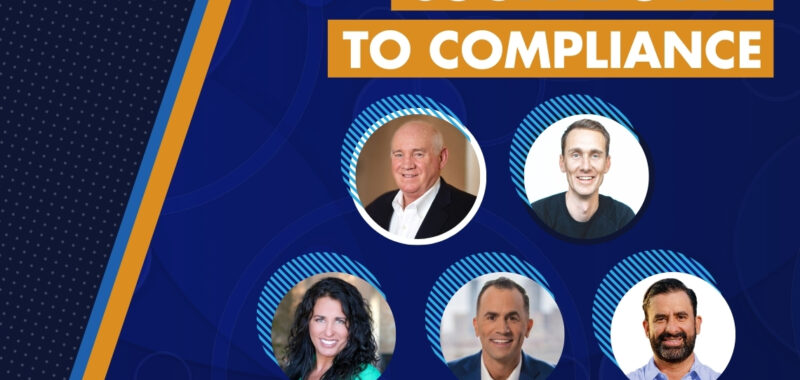The way that real estate business is conducted is changing, and the industry must accept and adapt, adhering to fiduciary duties and ensuring transparency with clients. In the latest RISMedia webinar—”Countdown to August 17–Compensation and Commission Strategies Post-NAR Mandate”—thousands tuned in to hear real estate experts discuss how they’re handling new commission guidelines, risk management, agent training, client conversations and more to help you adapt to new regulations and continue thriving in the post-settlement environment.
Moderated by John Featherston, founder and CEO of RISMedia, panelists included Michele Harrington, CEO of First Team Real Estate; Anthony Lamacchia, broker/owner and CEO of Lamacchia Realty and Lamacchia Companies; James Dwiggins, CEO of NextHome, Inc., and Leo Pareja, CEO of eXp Realty.
Among other points made within a wide-ranging, hour-long session about the changing landscape of the industry and how they are adapting to it, Lamacchia discussed the misunderstandings and misinterpretations that have arisen from recent changes, and the importance of clear communication. Pareja emphasized the need for adaptation and the inevitability of change, while also highlighting the importance of consumer awareness. Harrington stressed the need for industry control and the importance of vocalizing needs to brokers and associations, while Dwiggins emphasized the importance of showing value to consumers and the opportunities that arise from industry changes. The group agreed on the importance of continual education, transparency and professional courtesy in navigating these changes.
Featherston, with 40-plus years of industry experience both on the business and media sides, first asked the participants how they are preparing their agents for the new normal.
“I don’t want to forget how we got here, and I think we need to keep talking about how we got here,” said Harrington. “I think we need to keep talking about the federal government, the DOJ getting involved in private transactions between private individuals, which is wrong. I very much listen to my agents. They know more about selling real estate than I do. I ask them, ‘How do you think we should do this? What do you think we need to do to make sure that we’re covering you, that we’re covering the buyers, and covering the sellers?’
“We were stuck with having to create this whole new environment for ourselves. And even though it’s terrible, I think our agents really showed us the way in how they want to run their business, and we took their lead.”
Dwiggins emphasized that everyone must embrace the new ways of conducting business and forget about the old, because the old ended up with a $1.8 billion jury verdict against industry incumbents.
“The industry has to let go of the past,” he stated. “I think NAR (National Association of REALTORS®) could argue whether they fumbled it or not. The reality was at the rate it was going, NAR would be bankrupted. And just to be clear, I think NAR has an extraordinarily important purpose in D.C., because without advocacy, we would not have this industry. Everybody needs to wake up to the fact that we can’t afford all of this litigation. So make a smart decision now and just reroute how everybody’s paid, and you’ve solved that issue.”
Featherston agreed, adding that transparency is even more important now, as buyers and sellers may question what is happening within the industry.
“One thing that hasn’t changed is the vast majority of homesellers are seeking to obtain the highest possible closing price and net proceeds for their home,” he said. “And if they think that we are the conduit to do that, they’re going to turn to us. They want transparency, and they want honesty.”
Buyer broker agreements were next up, with Harrington voicing the opinion that going forward should be nothing but positive vibes and results.
“One of the only good things that actually came out of this is that a buyer will now know what the deal is with their agent, what they’re paying as a commission and how they’re represented,” she said. “When you’re a new buyer, you don’t understand any of that; nobody really explains it to you.
“Training your buyer agents on how to make sure they can show their value, how they can make a great agreement and have a great presentation is going to be better for the industry, so I love that part of all this.”
Lamacchia amplified those points, noting that even just a few years ago things were different, and now it’s time to get back down to basics.
“The idea of sitting down with a buyer, going through a presentation, explaining what you do, explaining the process, explaining how fees are paid, this is not something new,” he said. “Generally speaking, there have been maybe a higher percentage of people that got away from that, particularly since 2020 when it started to come down to which agent could run the fastest, and whatever agent could run the fastest once the Covid summer lifted and for three years straight sold the most homes. Well, now you have to get back to preaching value, showing them what you’re going to do, but consumers want it.”
Pareja put a perfect capper on the webinar.
“This is a grand social experiment at scale in the real estate industry,” he said. “Let’s brace for the confusion. Let’s expect there to be confusion, not only on the agent side, but have grace for the consumers. There are going to be buyers who call you and say, ‘I don’t want to sign anything.’ Don’t get disrespectful. They are learning with us. This has never happened. And again, grace and respect. We’re in this together, and this too shall pass.”
To view more webinars from RISMedia, subscribe to our YouTube channel.

